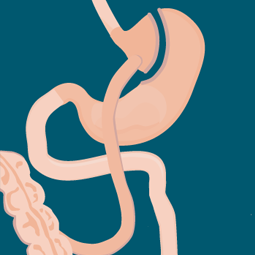Laparoscopic Gastric Bypass
 Gastric bypass surgery is the most commonly known weight loss surgery procedure. In the gastric bypass procedure (RNY gastric bypass) a small stomach pouch is created. This is then connected to a short segment of the small bowel. The food directly enters the esophagus to the stomach pouch and then the small bowel. It completely bypasses the stomach.
Gastric bypass surgery is the most commonly known weight loss surgery procedure. In the gastric bypass procedure (RNY gastric bypass) a small stomach pouch is created. This is then connected to a short segment of the small bowel. The food directly enters the esophagus to the stomach pouch and then the small bowel. It completely bypasses the stomach.
Who are candidates for the gastric bypass?
- Body Mass Index (BMI) of 40 or higher, or;
- BMI between 35 and 39.9, with significant obesity-related medical problems
- A long-standing history of obesity with multiple failed attempts at weight loss in the past, preferably with organized, medically supervised programs
- Between 18 and 60 years of age (patients outside this age range may be considered on a case-by-case basis)
- Not be actively smoking or abusing drugs or alcohol
- Commit to long-term follow up and lifestyle modifications
The Surgery
This bypass surgery is performed under general anesthesia and takes about one to two hours to complete. Since this surgery is laparoscopic, the surgeon will make small incisions in your abdomen instead of one big incision, and insert a special camera and the surgical instruments that will aid in developing the small stomach pouch and rerouting the intestine.
Advantages to Laparoscopic Gastric Bypass
- Greatest weight loss
- Greatest co-morbidity reduction
- Best operation for diabetes
- Cures reflux in >95%
- Long studied history of use
- Gold Standard for bariatric surgeries
Risks associated with Laparoscopic Gastric Bypass
- Leakage at the sight of the anastamosis (where the new stomach pouch is created)
- Dumping syndrome*
- The new stomach pouch can stretch and weight may be regained over time
- Need for additional weight loss surgery
- Bleeding
- Blood clots
- Anesthesia complications
- Death
*Dumping syndrome is an unpleasant condition that can occur shortly after eating sweets or any meal containing processed sugars after a patient undergoes gastric bypass. Patients with RNY bypass cannot tolerate sugar in their diets. Even if it doesn’t taste sweet, dumping syndrome can occur. Dumping syndrome can include any of the following: cramping and explosive diarrhea, overwhelming flu-like fatigue, nausea, lightheadedness, sweating and heart palpitations.
Pre-surgery
Stopping smoking has shown to significantly decrease complications and reduce chances of leaks. You are encouraged to begin a healthy diet consisting of smaller, more frequent meals in the weeks leading up to your operation. You should incorporate healthier foods into your diet and exercise more. Doing so will help you launch your healthier lifestyle and possibly lose weight prior to surgery, as well as reduce risks and enhance surgical outcomes.
Post-surgery
Most patients will be hospitalized for only one to two days following surgery. You will be prescribed pain medication to make you more comfortable. While exercise and heavy lifting are not permitted right after surgery, walking is encouraged to prevent blood clots. Many patients can go back to work after only one week. A full recovery can take up to three weeks.
In the first 24 hours you can only drink clear liquids to make certain you have no problem consuming or retaining fluids. You will adhere to a liquid diet including special protein shakes in the two weeks after surgery, followed by two weeks of pureed food before being reintroduced to solid foods. You will be provided with a post-surgery nutrition plan, complete with a vitamin and mineral regimen that should be followed to prevent malnutrition. Our registered dietitians will explain this in great detail before your surgery and again before your discharge.
We are here to assist you along the way, providing encouragement and answering your questions.
For more information...
Contact Ashley Austin, DNP at 229-931-1152 or e-mail ajaustin@phoebehealth.com.